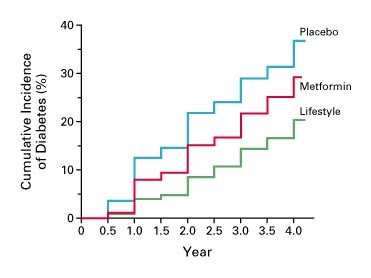Discover how diabetes prevention quizzes and challenges can test your knowledge and help you make lifestyle changes. Learn from experts and real-life success stories to manage and reverse diabetes effectively.
Heald Membership: Your Path to Diabetes Reversal
Table of content
Introduction
As an endocrinologist specializing in diabetes reversal, I often encounter patients who are eager to learn more about managing and preventing diabetes. One effective way to engage and educate people about diabetes prevention is through quizzes and challenges. These interactive tools not only test your knowledge but also provide valuable insights into lifestyle changes, weight loss, nutrition, and other critical aspects of diabetes management.
So, let's get started on this journey of discovery and empowerment. Ready to test your knowledge and take control of your health? Let's dive in!
Understanding Diabetes and Its Reversal
Diabetes is a chronic disease that affects millions of people worldwide. It occurs when your body either doesn't produce enough insulin or can't effectively use the insulin it produces. This leads to elevated blood sugar levels, which, over time, can cause serious health problems, including heart disease, nerve damage, and kidney failure.
However, diabetes is not a one-way street. With the right lifestyle changes, it is possible to manage and even reverse diabetes. This is where programs like HealD come into play. At HealD, we believe in a comprehensive approach to diabetes reversal, incorporating elements such as nutrition, behavioral psychology, and AI-driven tools to support our clients every step of the way.
The Power of Quizzes and Challenges
Quizzes and challenges can be powerful tools in the fight against diabetes. They are not just for fun; they serve as educational resources that can help you understand your risk factors, recognize symptoms, and learn about effective prevention strategies. Let's explore how these tools can make a difference in detail.
Educating About Risk Factors
One of the most significant benefits of quizzes and challenges is their ability to educate people about the risk factors associated with diabetes. Many individuals may not be aware of the various factors that increase their risk of developing diabetes. By taking a quiz, they can identify these risk factors and understand their personal level of risk.
For example, a quiz might include questions about family history, weight, diet, and physical activity levels. By answering these questions, individuals can see how their lifestyle choices and genetic predispositions might put them at risk for diabetes. This awareness is the first step towards making necessary lifestyle changes.
Recognizing Symptoms Early
Early recognition of diabetes symptoms is crucial for timely intervention and prevention. Quizzes can help individuals recognize the early signs of diabetes that they might otherwise overlook. Symptoms like increased thirst, frequent urination, unexplained weight loss, and fatigue can often be mistaken for other health issues.
A well-designed quiz can highlight these symptoms and prompt individuals to seek medical advice if they notice any of them in their daily lives. Early detection can lead to early treatment, which is essential for preventing the progression of diabetes and avoiding complications.
Learning Effective Prevention Strategies
Quizzes and challenges also provide an interactive way to learn about effective diabetes prevention strategies. Instead of passively reading information, individuals actively engage with the content, which can enhance understanding and retention.
For example, a challenge might involve setting daily or weekly goals related to diet and exercise. Participants could track their progress and see the immediate benefits of their efforts. Challenges can be designed to promote healthy eating habits, regular physical activity, and stress management— all critical components of diabetes prevention.
Engaging and Motivating
Interactive quizzes and challenges are inherently more engaging than traditional educational materials. They introduce a fun, competitive element that can motivate individuals to participate and stick with the program. This is especially important for maintaining long-term lifestyle changes, which are necessary for diabetes prevention and management.
For instance, a community-based challenge where participants compete to see who can log the most steps in a month can encourage physical activity. Similarly, a nutrition quiz with a leaderboard can motivate individuals to learn more about healthy eating and make better dietary choices.
Providing Personalized Feedback
Quizzes and challenges can be tailored to provide personalized feedback based on an individual's responses. This personalized approach can make the information more relevant and actionable. For instance, if a quiz indicates that someone is at high risk for diabetes due to their sedentary lifestyle, the follow-up challenge might focus on gradually increasing their physical activity levels.
At HealD, we use AI-driven tools to offer personalized feedback and support. Our quizzes are designed to adapt to each user's unique situation, providing customized advice and recommendations to help them manage their risk factors effectively.
Encouraging Behavioral Change
Behavioral change is at the heart of diabetes prevention and management. Quizzes and challenges can play a crucial role in facilitating this change by breaking down the process into manageable steps. They can help individuals set realistic goals, monitor their progress, and stay motivated.
For example, a weight loss challenge might involve setting a goal to lose a certain amount of weight over a specific period. The challenge can provide tips on healthy eating, exercise routines, and other strategies to help participants achieve their goals. Regular check-ins and progress tracking can keep participants accountable and motivated.
Example Quiz: Are You at Risk for Diabetes?
Let's start with a simple quiz to assess your risk for diabetes. Answer the following questions honestly to get a better understanding of your risk level:
1. Do you have a family history of diabetes?
Family history plays a significant role in your risk for diabetes. If your parents, siblings, or other close relatives have diabetes, you are more likely to develop the disease. This genetic predisposition means that your body might be more prone to insulin resistance or reduced insulin production.
2. Are you overweight or obese?
Excess weight, especially around the abdomen, increases your risk of developing type 2 diabetes. Fat tissue, particularly visceral fat, produces hormones and other substances that can lead to chronic inflammation and insulin resistance. Maintaining a healthy weight through diet and exercise can significantly reduce your risk.
3. Do you lead a sedentary lifestyle?
Physical inactivity is a major risk factor for diabetes. Regular physical activity helps your body use insulin more efficiently, lowers blood sugar levels, and keeps your weight in check. A sedentary lifestyle, on the other hand, can lead to weight gain and increase the risk of developing insulin resistance.
4. Do you have high blood pressure?
High blood pressure is often associated with an increased risk of diabetes. Both conditions share common risk factors, such as obesity and a sedentary lifestyle. Hypertension can also damage blood vessels and lead to complications that make diabetes management more challenging.
5. Do you often feel thirsty or hungry, even after eating?
Increased thirst (polydipsia) and hunger (polyphagia) are classic symptoms of diabetes. High blood sugar levels cause your kidneys to work harder to filter and absorb the excess glucose, leading to increased urination and thirst. Additionally, when your body can't use glucose properly, it signals your brain that you need more food, resulting in constant hunger.
6. Have you noticed unexplained weight loss?
Unexplained weight loss, despite eating more, can be a sign of diabetes. When your body can't get energy from glucose, it starts burning fat and muscle for fuel, leading to weight loss. This symptom is more common in type 1 diabetes but can also occur in type 2 diabetes.
7. Do you experience frequent urination?
Frequent urination (polyuria) is another common symptom of diabetes. High blood sugar levels overwhelm your kidneys' ability to filter glucose, leading to the excretion of excess glucose in urine. This process also draws more water from your body, increasing the frequency and volume of urination.
Understanding Your Results
If you answered "yes" to any of these questions, you might be at an increased risk for diabetes. The more "yes" answers you have, the higher your risk. Here’s what each "yes" might indicate:
1-2 "yes" answers: You have some risk factors for diabetes. It's essential to monitor your health and make lifestyle changes to reduce your risk.
3-4 "yes" answers: Your risk for diabetes is moderate. Consider consulting a healthcare provider for a thorough assessment and personalized advice on diabetes prevention.
5 or more "yes" answers: You are at high risk for diabetes. Immediate lifestyle changes and medical intervention are crucial to prevent or manage diabetes.
Taking Action
Understanding your risk is the first step towards diabetes prevention. Here are some actionable steps based on your quiz results:
For Those with 1-2 "Yes" Answers:
Monitor Your Health: Keep track of your weight, blood pressure, and blood sugar levels regularly.
Increase Physical Activity: Aim for at least 150 minutes of moderate exercise per week.
Eat a Balanced Diet: Focus on whole foods, reduce sugar intake, and avoid processed foods.
For Those with 3-4 "Yes" Answers:
Consult a Healthcare Provider: Get a comprehensive health check-up and discuss your risk factors.
Join a Diabetes Prevention Program: Programs like HealD can provide personalized guidance and support.
Adopt Healthier Habits: Make consistent changes to your diet and physical activity levels.
For Those with 5 or More "Yes" Answers:
Seek Immediate Medical Advice: Schedule an appointment with an endocrinologist or healthcare provider.
Begin a Structured Diabetes Management Plan: Programs like HealD offer integrated support, including nutrition coaching, behavioral psychology, and AI-driven tools.
Make Lifestyle Changes: Focus on weight loss, healthy eating, regular exercise, and stress management.
Lifestyle Changes: The Foundation of Diabetes Prevention
One of the key components of diabetes prevention and reversal is making sustainable lifestyle changes. This includes adopting a healthy diet, maintaining a regular exercise routine, and managing stress effectively.
Nutrition
A balanced diet is fundamental to diabetes prevention. Focus on incorporating whole foods such as vegetables, fruits, lean proteins, and whole grains into your meals. Avoid processed foods and sugary drinks, which can spike your blood sugar levels. At HealD, our nutrition coaches work with clients to create personalized meal plans that suit their individual needs and preferences.
Weight Loss
Maintaining a healthy weight is crucial in preventing diabetes. Even a modest weight loss of 5-10% of your total body weight can significantly reduce your risk. Engage in regular physical activities such as walking, swimming, or cycling. Aim for at least 150 minutes of moderate-intensity exercise each week.
Behavioral Psychology
Changing habits can be challenging, which is why behavioral psychology plays a vital role in diabetes management. Working with a behavioral psychologist can help you identify and overcome barriers to healthy living. Techniques such as goal setting, positive reinforcement, and stress management can be incredibly beneficial.
The Role of AI in Diabetes Prevention
Artificial Intelligence (AI) is revolutionizing healthcare, and diabetes management is no exception. AI-driven tools can help monitor your health, track your progress, and provide personalized recommendations. At HealD, we leverage AI technology to offer real-time insights and support to our clients, ensuring they stay on track with their health goals.
Challenges: Putting Knowledge into Action
Quizzes are a great start, but challenges take your knowledge to the next level by putting it into action. Here are a few diabetes prevention challenges you can try:
7-Day Healthy Eating Challenge
For one week, commit to eating only whole, unprocessed foods. Plan your meals ahead of time and avoid eating out. Keep a food journal to track what you eat and how you feel.
30-Day Exercise Challenge
Set a goal to exercise for at least 30 minutes every day for a month. Mix up your routine with different activities like walking, yoga, and strength training. Track your progress and celebrate your achievements.
Stress Management Challenge
Stress can negatively impact your blood sugar levels. For this challenge, practice a stress-relief activity every day for a month. This could be meditation, deep breathing exercises, or a hobby you enjoy.
Success Stories: Real-Life Impact
At HealD, we have seen numerous success stories of individuals who have transformed their lives through our diabetes reversal program. One such example is John, a 45-year-old man diagnosed with type 2 diabetes. By participating in our program, which included personalized nutrition coaching, regular check-ins with a behavioral psychologist, and AI-driven support, John was able to lose 30 pounds and bring his blood sugar levels back to normal.
Scientific Evidence

Research supports the effectiveness of lifestyle interventions in preventing and managing diabetes. According to a study published in the New England Journal of Medicine, lifestyle changes, including diet and exercise, reduced the incidence of type 2 diabetes by 58% in high-risk individuals. Another study in Diabetes Care found that weight loss and increased physical activity significantly improved glycemic control in people with type 2 diabetes.
Common Life Problems and Solutions
Many people struggle with integrating healthy habits into their busy lives. Here are some common problems and practical solutions:
Problem: Lack of Time
Solution: Prioritize your health by scheduling workouts and meal prep into your calendar. Even short bursts of activity, like a 10-minute walk, can add up over the day.
Problem: Unhealthy Cravings
Solution: Keep healthy snacks on hand, such as nuts, fruits, and yogurt. Drink plenty of water and avoid skipping meals, which can lead to overeating.
Problem: Stress and Emotional Eating
Solution: Identify your triggers and find alternative ways to cope with stress, such as talking to a friend, going for a walk, or practicing mindfulness.
HealD: Your Partner in Diabetes Prevention
At HealD, we offer a comprehensive diabetes reversal program that integrates nutrition, behavioral psychology, and AI technology to support you on your journey. Our team of experts, including doctors, nutrition coaches, and behavioral psychologists, work together to create a personalized plan that fits your lifestyle and goals.
Conclusion
Diabetes prevention and reversal are achievable with the right knowledge and tools. Quizzes and challenges are excellent ways to test your understanding and put your knowledge into action. Remember, small changes can make a big difference in your health.
Ready to take charge of your health? Book an appointment with our experienced endocrinologists at HealD today and start your journey towards diabetes reversal.

Popular Blogs
Comments









